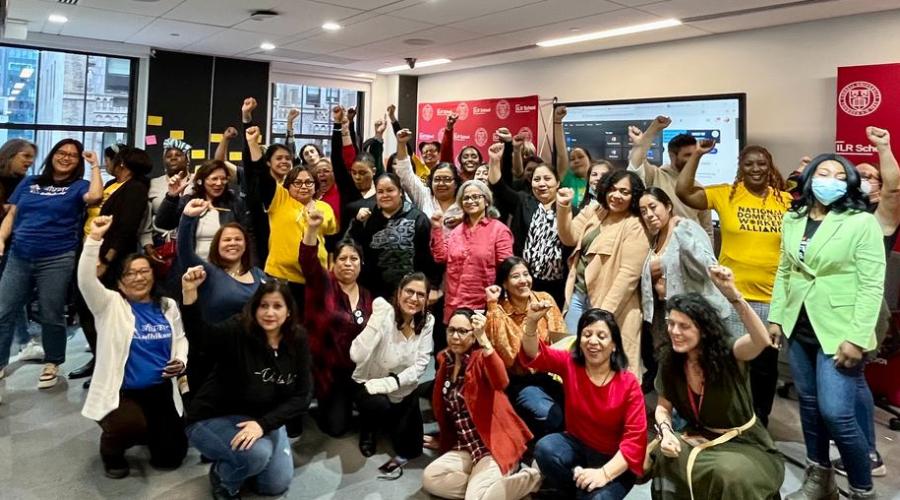
Domestic Workers Rising
How Peer Education Is Improving the Working Conditions of Nannies
Domestic workers perform the critical labor of caring for children and cleaning homes, yet the value of their work has long been diminished with low pay and challenging workplace conditions. They have been excluded from core labor protections and collective bargaining rights because of who is performing this labor—disproportionately women of color and immigrants—and because of where this labor is carried out—in the home. This has meant domestic workers face various forms of exploitation: low hourly pay, wage theft, no overtime pay, and insufficient benefits such as paid leave or health insurance.
In response to these challenges, there is a long history of domestic workers organizing to improve their wages and working conditions and to bring recognition to their work. In New York State, recent organizing efforts resulted in the 2010 passage of the Domestic Workers Bill of Rights that enshrined into law important rights and protections for domestic workers. Yet, as in other industries where precarious workers have secured new legal rights, it can be hard to enforce the rights guaranteed by law—especially when the work is performed in the privacy of people’s homes.
To make these rights meaningful, workers themselves have to be empowered to enforce them. In the face of widespread workplace violations across low-wage industries, worker training and education have been one important tool to inform workers of their rights and to strengthen workers’ ability to advocate for themselves. This explainer shares the key findings of a recent report evaluating the impact of one such program—the We Rise Nanny Training in New York, a program carried out through a collaboration between a growing coalition of worker organizations and the Worker Institute at Cornell University’s ILR School. We Rise blends workers’ rights education with professional development, and uses a popular education and peer education approach in which nannies become trainers who teach a series of workshops to other nannies. The program aims to lift standards in the domestic work industry by:
- Training nannies in workers’ rights and negotiation skills
- Providing nannies with professional development that increases their employability
- Building nannies’ leadership within the movement advocating for domestic workers’ rights
What Are Popular Education and Peer Education?
The popular education theory behind the We Rise Nanny Training (and in other training programs at worker organizations) has a long history in worker education. As a form of worker education, popular education is grounded in the lived experience of workers, seeks to empower workers to challenge unequal power relations, and explicitly links theory and practice. As the number of worker centers and other worker organizations outside of conventional labor unions has rapidly grown in the 21st century, many of these organizations have widely employed popular education approaches in their training and leadership development for precarious workers. Alongside the rise of popular education, there has also been an increase in peer education models, which train people from a particular community or workforce to become peer trainers, promotoras, or community health workers. In the U.S., promotora and community health workers have largely worked in public health programs within Latine and immigrant communities, sharing knowledge and skills within their community for people who often face barriers to accessing mainstream institutional channels of support. In the realm of worker education, the promotora model has been used by janitorial workers in California to confront workplace sexual violence and harassment. More broadly, the peer education approach has gained a strong foothold in the realm of occupational safety and health training programs for workers.
What We Found: Evaluation of the We Rise Nanny Training
The Worker Institute carried out an 18-month mixed-method evaluation of the We Rise Nanny Training, shaped by the principles of community-based participatory research, with the following objectives:
- to understand the degree to which the program had a meaningful impact on domestic workers’ workplace conditions;
- to better understand the impact of the training on nannies’ leadership development; and
- to better understand how the design of the We Rise program enabled its success or pointed toward challenges.
Overall, our evaluation of the We Rise Nanny Training program highlighted the important role that peer education and popular education can play in improving domestic workers’ workplace conditions, enforcing and raising standards within the industry, and fostering solidarity and organizing. Our evaluation suggests that the program has a significant impact on participants’ ability to negotiate with their employers and secure higher standards such as wage increases and written contracts, as well as expanding the number of participants who engage in base-building, information sharing, and organizing activities within the movement for domestic workers’ rights.
For those seeking to enforce and lift standards for domestic workers and other precarious workers, our recommendations build on the strengths of We Rise and aim to scale the impact of such programs:
- Recognize popular education and peer training as a critical part of enforcing and lifting standards for domestic workers and other precarious workers.
- Expand access to training programs that ground professional/workforce development firmly within a framework for building workers’ power.
- Integrate training programs into broader strategies to institutionalize precarious workers’ collective power.
- Support the sustainable expansion of the We Rise Nanny Training for domestic worker organizations.
Below are some of the key findings from this evaluation. The full report is available here.
Negotiation, wages, and working conditions
Our research found that the We Rise training strengthens nannies’ ability and drive to negotiate with their employers for higher wages and better working conditions; within six months of taking the training, there was a significant increase in the percentage of nannies who had successfully negotiated. Importantly, negotiation is the key lever that individual nannies can use to improve their working conditions. The findings showed that the training supports nannies not only in negotiating higher wages but also in securing measures such as written contracts and overtime pay, which help formalize their employment and improve their employers’ compliance with employment law.
Sources of confidence and motivation
We Rise participants and lead trainers widely emphasized how learning about legal rights and fair standards bolstered nannies’ confidence and sense of validation in speaking up and negotiating. Our research also suggests that the training’s emphasis on the value of domestic workers’ labor motivated nannies to advocate for themselves on the job and to become more involved in organizing for domestic workers’ rights.
Participants, trainers, and organization staff and “captains” (nannies who coordinate the training programs at their organizations) all emphasized the impact of the certificates of participation that We Rise training graduates receive from the Worker Institute. The certificates were seen to strengthen nannies’ “employability” and provide nannies leverage in their ability to negotiate with employers. The certificates were also seen as a means of formalizing and professionalizing this industry, and as a source of confidence, pride, and validation for many nannies.
Cultivating solidarity
The peer and popular education design of the We Rise training appears to instill in nannies the sense that they are part of a greater movement of domestic workers pushing for industry-wide change. This experience of solidarity seems to bolster workers’ drive and confidence to make changes in their own workplaces in the first instance, and across the industry in the second.
The confidence and strength that nannies drew from feeling that they were part of a broader movement also appears to fuel a deeper sense of commitment to the collective—as evidenced by the significant increases in sharing rights information (from 76% before the training to 89% six months after the training), participating in organizing (from 6% to 27%), and doing outreach to other nannies (17% to 35%).
Building the base for domestic worker organizing
Our interviews and focus groups suggest that the specific design of the We Rise Nanny Training—integrating workforce development with training in workers’ rights and negotiation, delivered through a peer education approach—has been a useful strategy for bringing nannies into the movement for domestic workers’ rights. This approach appears to create an effective pathway for precarious workers to become involved in organizing and collective action.
Organizing and leadership development to raise standards
Our findings suggest that the training also functions as an important “leadership ladder” where nannies can move into the roles of peer trainers and We Rise “captains.” The We Rise training also influenced nannies to become more involved in organizing activities to lift standards across the industry and to share information about domestic workers’ rights with other nannies.
Barriers to negotiation
While most interviewees and survey respondents were able to successfully negotiate a raise and/or other improvements in their working conditions within a year after taking the We Rise training, some faced challenges. These challenges pointed toward certain limits of individual negotiations in changing the unequal power relations that domestic workers navigate. These unequal power relations were visible when workers’ negotiations were constrained by lower employment standards in the neighborhoods where they worked, or when employers simply refused to negotiate. In recognition of these limits, the We Rise coalition is currently advancing Care Forward, a multi-pronged initiative to raise domestic work standards at the neighborhood level.
Looking ahead
In the face of widespread workplace violations across low-wage industries and the challenges of enforcing the legal rights of precarious workers, the model of the We Rise Nanny Training represents one critical tool for bolstering workers’ ability to advocate for their rights and improve their wages and working conditions, while also expanding participation in the broader movement for domestic workers’ rights.
Read the full report here.
If your organization is interested in bringing this model to your members, please email werisecoordinator@gmail.com.



